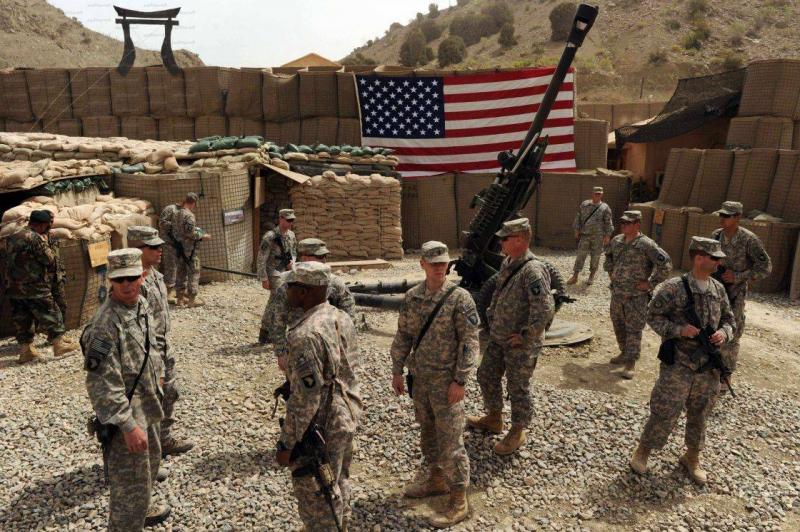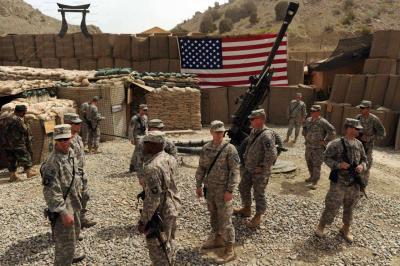Washington is moving towards canceling agreements with Iraq regarding the scheduling of its troop withdrawal. Iraqi officials stated that the recent attack involving two rockets on the "Ain al-Assad" base is behind this shift. This comes amid a disagreement between the foreign ministries of the two countries over the interpretation of diplomatic phrases concerning the future of the international coalition against ISIS, led by the United States. It is clear that the negotiation process regarding the withdrawal of American troops from Iraq has stalled from the U.S. side.
**Announcement Postponed**
On Thursday, the Iraqi Foreign Ministry stated that Baghdad has decided to postpone the announcement of the end of the international coalition mission led by the United States. They added, "Only the details and timing of the announcement and some other logistical aspects remain to be agreed upon. We were very close to announcing this agreement, but due to recent developments, the announcement of the end of the international coalition’s military mission in Iraq has been postponed." The U.S. State Department denied that negotiations with the Iraqis were about withdrawal, asserting that they were focused on developing relationships and coordinating security efforts. Iraqi media reported that the Iraqi Prime Minister was on the verge of announcing the withdrawal of the international coalition from the country, a fact confirmed by former Prime Minister Nouri al-Maliki during a meeting with journalists in Baghdad, where he stated: "The withdrawal of the international coalition was scheduled according to an agreement between the two parties, were it not for the shelling that targeted the 'Ain al-Assad' base."
The Iraqi military base, which hosts American advisers, was hit by two rockets, claimed by an unknown group calling itself "Revolutionaries." Security forces arrested individuals they said were involved in launching the rockets after seizing the launch platform. However, within a week, they announced the release of all individuals due to lack of evidence of their involvement in the attack. The United States announced that several American soldiers present at the base, as part of the international coalition mission in Iraq, were injured.
Since February, the Iraqi government has maintained a critical truce with armed factions, claiming they are solely responsible for the negotiations regarding the withdrawal of American troops. The agreement between the government and the factions, brokered through Shiite political intermediaries, was primarily based on the premise that any hostile action against Americans would permanently jeopardize their withdrawal negotiations, according to officials.
Nevertheless, statements from both Baghdad and Washington indicated that the two countries were negotiating to end the international coalition mission to transition to a permanent security partnership, which angered extremist armed groups, such as the "Nujaba Movement" and "Hezbollah Brigades."
**Ambiguity or Dispute?**
On Thursday evening, U.S. State Department spokesman Matthew Miller stated, "We have had discussions with the Iraqi government about the future of the international coalition, including when Prime Minister Mohammed Sudani met with President Biden here in Washington in April. We have not discussed at any time the withdrawal of U.S. troops from Iraq, but we continue to talk about what we might call a bilateral security partnership." He added, "Sudani highlighted this in his statement during his communication with Secretary Blinken; these discussions continue and are based on previous bilateral agreements, with strategic discussions rooted deeply. What I would like to say is our mutual commitment to enhancing security cooperation and shared interests and regional stability."
The Iraqi Foreign Ministry quickly responded to the American statements by saying they were "inaccurate." The ministry's statement indicated, "The work of the high military committee has focused over the past months on assessing the threat posed by ISIS with the aim of reaching a deadline to end the military mission of Operation Inherent Resolve. On this basis, the presence of advisers from the international coalition of all nationalities on Iraqi soil will be ended."
The Iraqi Foreign Ministry clarified that discussions regarding this matter had included details about the sequence of the withdrawal of advisers from the sites, with only the agreement on details and timing of the announcement and some logistical aspects remaining. They emphasized that "the bilateral relationship with the United States in all areas, including security, is completely separate from the course of the relationship with the international coalition forces," affirming that "this relationship existed before the coalition and will continue after it." They pointed out that "the Iraqi delegation discussed the future of the security relationship in areas of training, armament, equipment, and security cooperation, in light of what the Iraqi constitution allows and the framework of the strategic agreement between Iraq and the United States."




